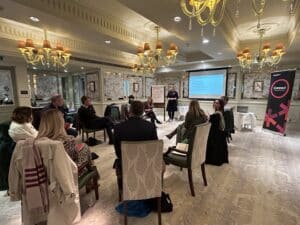Last week we hosted our Connect members for the first in a series of workshops on Strategy & Transformation topics. This session was focussed on, “Communicating change and organisational storytelling: The three big pitfalls and how to avoid them.” Many thanks to Rose Beauchamp for a truly inspiring session, educating us on how to think outside the box and providing a powerful catalyst for change through the communications you share and the stories you tell to the organisation.

With leaders from a range of industries and sectors we had the perfect forum for networking and sharing of experiences to uncover some key insights about what makes organisational storytelling and change communication so unique.
Firstly, it transcends personal threat and demands continuous, evolving communication as the transformation evolves. Additionally, it is imperative to acknowledge the diverse starting points of stakeholders within the organisation that you are engaging with, ensuring to tap into the feelings – not just the transactional facts around the change. With this in mind, we delved into the three significant pitfalls and how to avoid them:
- Failing to understand the audience’s story: Stories circulating within an organisation take on various forms—fear, fantasy, formula. Leadership’s challenge is to comprehend the diverse thoughts circulating and recognise that each individual’s prior encounters with change shape their receptiveness to future initiatives
- Failing to address the audience’s questions: Leadership’s responsibility extends beyond delivering quality and consistent answers that address both organisational and personal perspectives. The metaphorical guidance here is to “teach your audience the words to the song and help them sing it,” but also consider that “the beat can stay the same, but the words can be different”, when delivering to wider audiences and wanting to foster a collective understanding. Leaders should also ask themselves “what questions they hope don’t come up?” as to ensure the challenging topics are well-prepared for (and also role play these questions to make sure you’re comfortable to answer them)
- Failing to make your story compelling enough to compete: In a world becoming increasingly digital, emphasis on face-to-face communication is crucial when delivering change (where possible). The workshop stressed the significance of an “oral culture” and explored the value of metaphors, images, and relatable anecdotes to create a narrative that captivates and brings the audience closer to the reality of change.
We enjoyed the session and sharing collective experiences as well as some practical tips to try out.


